
|   |

|   |
Varying forms, engaging communication - S D Desai e-mail: sureshmrudula@yahoo.co.in Photos courtesy: Darpana October 26, 2014  Court Martial Not that none of the earlier plays at Natarani’s Sunday to Sunday National Theatre Festival of plays carefully selected by Mallika Sarabhai from across genres and having self and society as their themes deserved a standing ovation, but they had reserved it for Asmita Theatre’s second play Court Martial staged on Oct 8. Such was the impact Swadesh Deepak’s play directed by Arvind Gaur had made. The performance powerfully brought home to the audience hierarchical exploitation, caste discrimination and class prejudice that have seeped deep into our systems, including the army. In a momentary scene, the play shows up gender prejudice against women as well. As Kavita Parikh, who was by my side, perceptively observed, though the victim and accused - more sinned against than sinning with a single violent act when humiliation was unbearable - sits silent in a corner most of the time during the court proceedings, we keep looking at him with empathy. A dramatic performance certainly cannot change the attitude deep-rooted in our collective psyche overnight. Such trickles, however, can gradually create awareness regarding social injustice meted out to those unprivileged by birth. 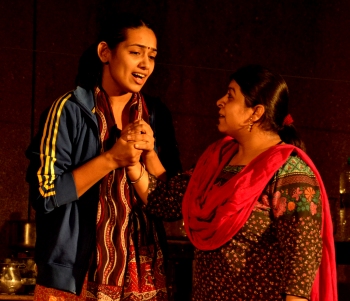 Chukayenge Nahin
On Oct 7, Asmita presented Chukayenge Nahin, Amitabh Srivasava’s Hindi adaptation of Dario Fo’s famous Italian play translated in English as Can’t Pay Won’t Pay. Two lower middle class housewives in it gleefully come home with sack full of household things they have grabbed at a local mall and have not paid for them. Fearing their husbands’ disapproval of this act and a possible police action, they hide them in front of their tummies and feign pregnancy! Within the format of a rip-roaring farce, the activist in Arvind Gaur, who has commendable theatre skills, scathingly satirizes as much the managers of our economy as the political class impervious to the woes of the common man. To a man, the audience enjoys the comedy of situations, the unending torrent of words and the satire underlying it all. It is said to have become a movement in Italy once to buy as much as you wish and pay as little as you could. Viewers of Chukayenge … had a good time laughing but they knew how far they may go too far! Spellbound The Festival, very well attended despite sweltering evenings, opened with Rajit Kapur’s Mahua. Birsa (Dhanendra), the 20-year old Adivasi of a village in Orissa in this play (Akash Mohimen) based on a bit of research and a workshop, is addicted to Mahua, a ‘desi’ brew. The farm labourer’s addiction has a kind of justification in his impending displacement in the name of development from his land being claimed for mining and a forced marriage with a virago of a woman (Sadiya) twelve years older. There are signs of a thaw in their relationship but a pathetic end is inevitable. A starkly realistic depiction with good acting and direction is the strength of the play. The sprinkling of expletives is so generous all through the performance the stage would have to be sanitized were a Bharatanatyam performance with its spiritual import to follow! 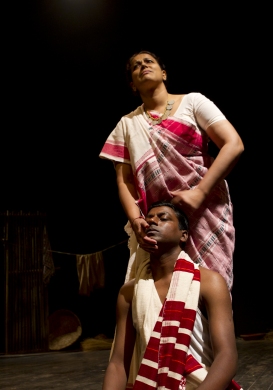 Mahua 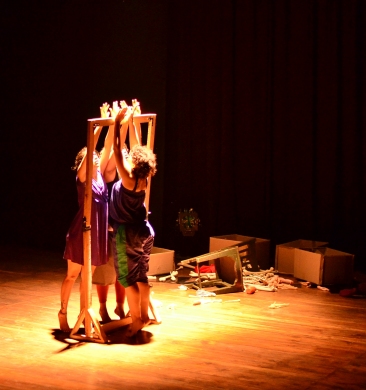 Unselfed Even the young viewers who laughed at wrong but predictable places in Mahua remained spell-bound in silence trying to get to the complex meaning of the unconventional clusters of strong visual images, seemingly unconnected, reminding one also of the absurd theatre, in Monday’s Unselfed under the direction of Sujay Saple. A specimen of physical theatre, it is nonverbal almost fully. Lights and music help them remain engaging. Among the five girls, there are contemporary dancers and theatre practitioners besides a classical dancer. They silently interact, engage in mirror images, lie motionless, seem to slough off skin, do bizarre things as well of seeming to pass liquid from mouth to mouth. In the process, they do succeed in conveying it in parts that individually and collectively there are layers upon layers on what you think is your single self. 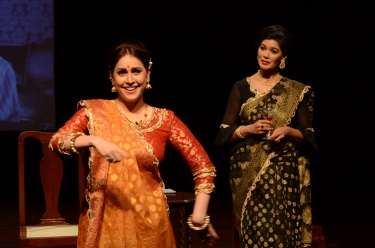 Three Women
On the fifth day at Natarani, I was thrilled to see emerging live on stage Tagore’s Nashtaneer Charu seen around fifty years ago with mugdha bhava on the screen through Satyajit Ray’s eyes in his classic Charulata. In a new role as playwright and director, Isheeta Ganguli in Three Women has Amrita, a non-Bengali, bring to her portrayal of Charu having her signature binocular in hands and lyrical sensitivity on face, in her movement and speech with such nuances, Ray’s Madhavi occasionally being flashed on the screen, I noticed that many in the audience were like me in a happy youthful mood even if now not so young! Bimala of Home and the World and Tagore’s muse Kadambari Devi came too. The two fictional women and the third from Tagore’s own family talked about what they could not in their time – sensitive but lonely, unable to express their love for the men they loved. In the second part, Isheeta has her beautiful three women emerge as 21st century high-heeled women in modern flamboyant dresses talking uninhibited about everything, including ‘Sex and the City’. In both the parts, besides Charu, Bimala came across rather convincingly but, candidly, in her rather husky voice, alien twang and affected demeanor, Kadambari was no match for the creative and intellectual genius we have known as Rabindranath Tagore. But it was the strains of Tagore’s songs that flowed in the voice of the fourth woman Isheeta Ganguli, competently accompanied by musicians on instruments, at the end that left a more lasting impression of Gurudev. Addicted Darpana Academy’s production of Madhu Rye’s original Gujarati play Koi Pan Ek Phool Nu Naam Bolo To, directed by Abhinay Banker with a young team bubbling with energy was the piece de resistance and the amphitheatre was packed to capacity with anticipation. Suspense, thrill and humour subtly camouflage in it the mystery that man-woman relationship is and here its dimensions overflow the confines of drama to blur the line between theatre and life. Sans sensationalism with music and lights despite a murder and a court trial, the play remains focused on the psychological factors underlying the events. 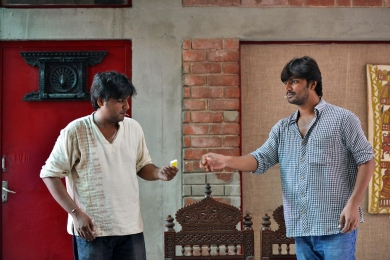 Koi Pan Ek Phool Nu Naam Bolo To 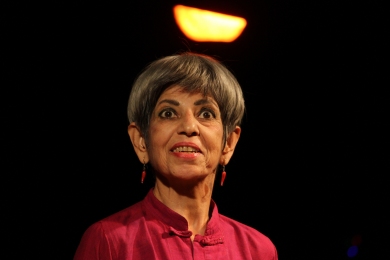
Untold Stories
The celebrated play with numerous short scenes, flashbacks, flashbacks-within-flashbacks and many a red herring, was the result of a collaboration between the playwright and the lead actor in the 1969 Darpana production, which was directed by Mrinalini Sarabhai herself with a very talented actor duo Damini Mehta and Kailash Pandya in the cast. With a tight control on all elements that go to make a good play, in the stage version the director has given particularly the heroine a semblance of a third dimension with the young player (Happy Bhavsar) remaining quite in tune with it with her expression. 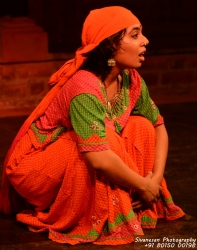 Aparadhini Within the format of the festival, the performances on the penultimate day remained subdued. A senior actor and artist, Bharati Kapadia emerged in her solo performance Untold Stories recalling an endless number of experiences from life as a sensitive human being. The string of experiences, beautifully articulated, seemed disjointed and did not find a focus though her gusto and an optimistic attitude despite vicissitudes anchored the performance. In the second half that evening, Meera Sitaraman came with her solo performance Aparadhini: Women without Men, which has stories of four women in prison for life for crimes ranging from robbery to murder. Under the direction of V. Balakrishnan, the young raconteur brilliantly narrates the stories, intermittently putting on improvised costumes. The stories bring out the human element involved. 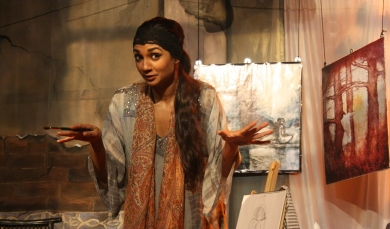 9 Parts of Desire Consumer interest cannot make the world small as empathy can. Art makes it possible. Heather Raffo’s pen first did it, then her acting. Ira Dubey has been doing it through 9 Parts of Desire under the direction of her mother Lilette, both celebrities on the stage and the screen. In presenting the harrowing real life stories of nine Iraqi women of varying ages and professions – a teenager, an artist, a doctor, a mother of many children, all of whom were killed in war, an intellectual and so on – in over an hour long solo performance, Ira, a barely 30 plus, proves her exceptional artistic temperament and caliber. Between the intense portrayals, coming in quick succession, she needs just a few seconds to get into improvised costumes, more importantly different moods and emotions, the common thread underlying them being trauma. In the right ambience provided by the lights and setting, her major resources are her eyes and face, movement and voice, each adept at developing nuanced expression. The irony is that the initial portrayal is of the artist, in whose room is the sketch of a nude woman whose painting was found by the playwright in an art centre named after one of the greatest sadists in the history of the mankind, Saddam Hussein. The zestful young actors of the noteworthy local dramatic production say, “Performing a play is intoxicating – you wish to keep doing plays every night!” When there are good plays at a theatre festival spectators get addicted to theatre too. Sunday-to-Sunday time span was not long enough for some of them! Dr. SD Desai, a professor of English, has been a Performing Arts Critic for many years. Among the dance journals he has contributed to are Narthaki, Sruti, Nartanam and Attendance. He guest-edited Attendance 2013 Special Issue. His books have been published by Gujarat Sahitya Academy, Oxford University Press and Rupa. After 30 years with a national English daily, he is now a freelance art writer. |